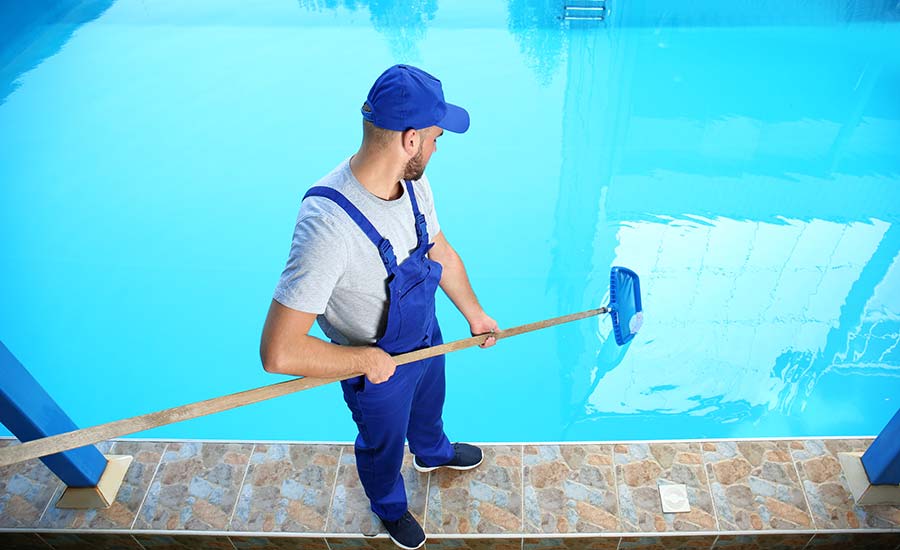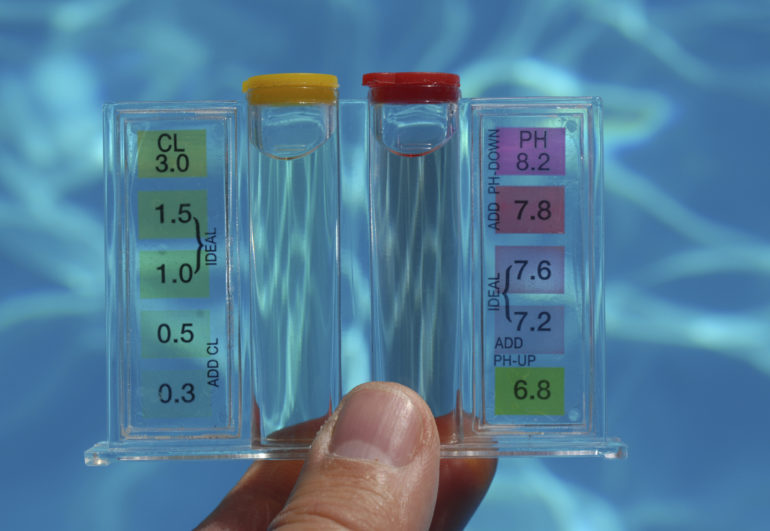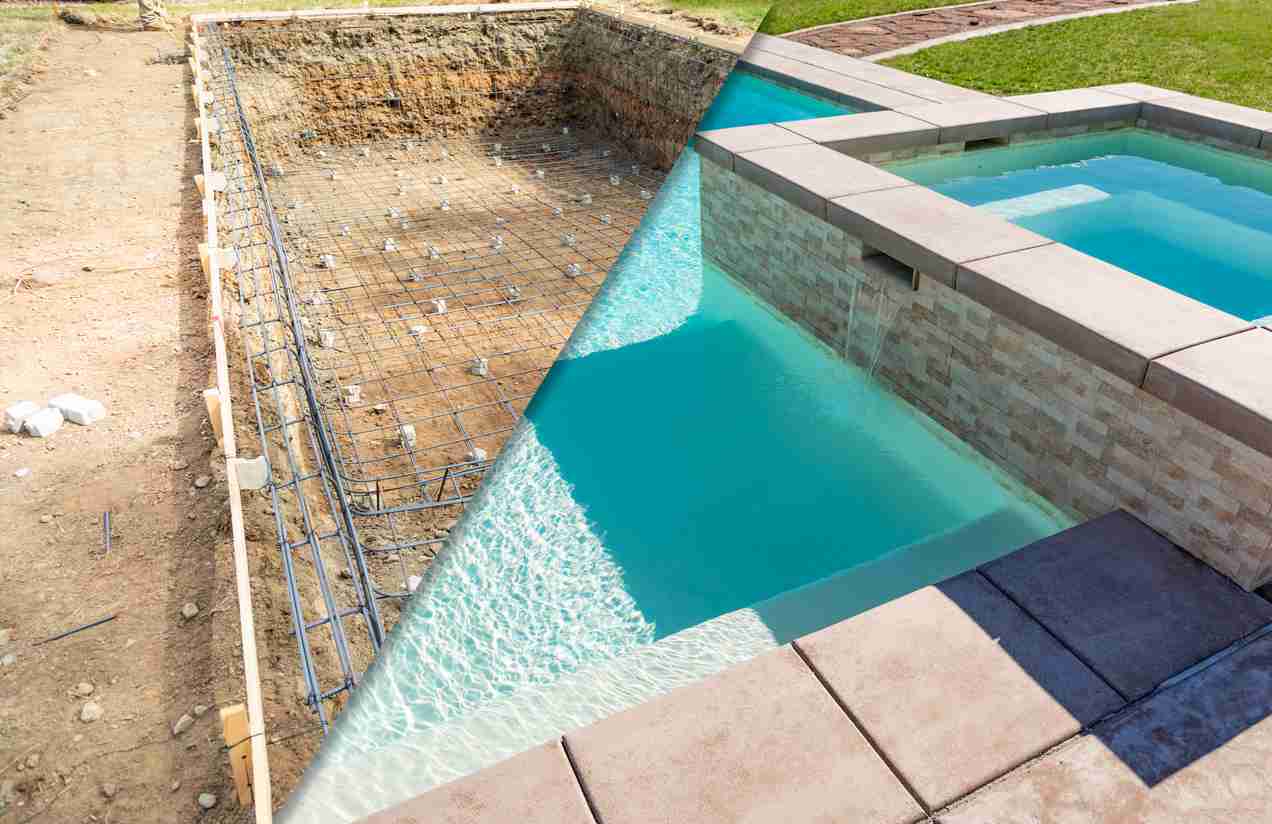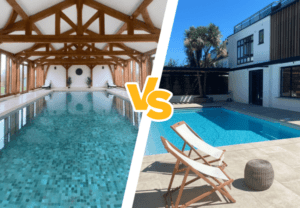Pools are an excellent addition to any home, providing homeowners with both luxury and convenience. However, deciding whether to install an indoor or outdoor pool can be challenging. Each choice offers benefits and challenges. However, it’s important to consider that the indoor and outdoor pool options have different costs, maintenance requirements, and year-round usability. To help homeowners make an informed choice, in this article, we’ll break down the ins and outs of indoor and outdoor pools and compare them on some key factors.
Overview of Indoor Pools
Indoor swimming pools offer a safe and regulated swimming environment, free from external factors. Typically, these pools are part of a home or located in a separate structure on the property. Common features include heating systems, complex air and humidity controls, and an attached locker room or lounge area.
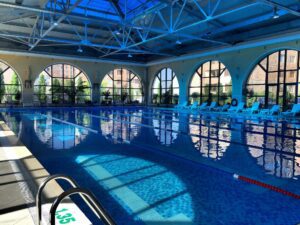
Advantages of Indoor Pools
An indoor pool has the advantage of being usable throughout the year, regardless of the weather outside. This makes it an appealing option for those residing in colder climates. Additionally, indoor pools provide a high level of privacy and security, which is attractive to homeowners concerned about privacy or safety issues. From a maintenance point of view, protection from the outdoors means less trash and therefore potentially lower cleaning and maintenance costs. Terms like “luxury indoor pool,” “residential indoor pool” and “indoor pool home” often images of these quiet, secluded corners of the water.
Disadvantages of Indoor Pools
But indoor pools have some disadvantages. “How much does an indoor pool cost” and “How much does an indoor pool cost” are common questions, and for good reason: Initial construction and installation costs can be significantly higher than for outdoor pools. Requirements for proper ventilation and moisture control to prevent mold growth and structural deterioration can also add to the overall cost. In addition, despite the appeal of the terms “indoor pool design” and “indoor pool projects for the home,” the complexity of these designs can further increase costs.
Overview of Outdoor Pools
Outdoor swimming pools are synonymous with summer relaxation and offer a refreshing alternative during the warmer months of the year. They blend seamlessly into the landscape. They enhance the aesthetic appeal of the property. Outdoor pools can be integrated into any outdoor living space with a variety of design and landscaping options.
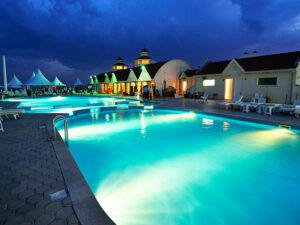
Advantages of Outdoor Pools
The appeal of natural sunlight and the integration of the pool into the environment are significant benefits. Not only do these features contribute to the overall enjoyment of the pool, but they also contribute to the health benefits associated with exposure to the sun. In terms of cost, “outdoor pool design” is often associated with a lower initial investment compared to indoor pools, making it a more affordable option for many homeowners.
Disadvantages of Outdoor Pools
Outdoor pools’ main limitation is seasonal use. In cold climates, a pool may only be usable for a few months of the year without additional heating, which can be costly. Maintenance can be difficult in bad weather and in the presence of trash. Therefore, when considering an outdoor pool design, you should also consider the long-term care and maintenance costs associated with these pools. Each choice offers benefits and challenges. However, it’s important to consider that the indoor and outdoor pool options have different costs, maintenance requirements, and year-round usability.
Cost Comparison of Indoor and Outdoor Pools
If you’re considering adding a swimming pool to your home, it’s important to understand what it will cost. The financial commitment doesn’t end with the initial installation; over time, ongoing maintenance costs can increase significantly. Here, we’ll take a look at the cost differences between indoor and outdoor pools, from initial installation to long-term maintenance.
Initial Construction and Installation Costs for Both Pool Types
The cost of installing a pool can vary depending on its type, size, and materials. Indoor pools tend to be more expensive due to the need for additional structures, ventilation, and heating systems to regulate humidity and temperature. Outdoor pools, on the other hand, are generally less expensive to install. Keep in mind that installing an outdoor pool may also require additional costs for landscaping and fencing. Hey there! Did you know that installing an outdoor pool can cost between $35,000 and $65,000? Indoor pools, on the other hand, can be a bit pricier, ranging from $40,000 to $200,000 or more depending on their complexity and features.
Comparison of Long-term Maintenance Costs, Including Cleaning, Chemical Treatment, and Repairs
Both indoor and outdoor pools require maintenance, including cleaning, chemical treatments, and periodic repairs. Outdoor pools need regular cleaning to remove debris and careful monitoring of chemical levels due to exposure to sunlight. They may also require repairs due to wear and tear or weather conditions.
Similarly, indoor pools require meticulous maintenance, even though they are protected from the outdoors. Maintaining air quality and humidity control in enclosed spaces, such as indoor pools, can increase energy costs. However, chemical treatments are still necessary to maintain water balance. Additionally, indoor pools may require more frequent cover replacement or repairs to the surrounding structure due to constant exposure to chlorinated water vapors. It’s important to note that these measures are necessary to ensure a safe and healthy swimming environment.
In extreme weather conditions, outdoor pools can be more expensive and require more frequent repairs and seasonal preparation. However, indoor pools have higher energy and maintenance costs due to their year-round use and the need for environmental control.
Maintenance of Indoor and Outdoor Pools
Regular maintenance is really important for keeping your swimming pool safe, clean, and long-lasting. You can achieve this by performing tasks such as cleaning the pool, checking chemical levels, and inspecting equipment regularly. By doing so, you will keep your pool in excellent condition and ensure its safety. It’s worth noting that both indoor and outdoor pools require regular pool maintenance, but there are some differences that pool owners should be aware of.
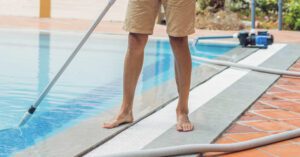
Detailed Comparison of Maintenance Requirements for Indoor vs. Outdoor Pools
Outdoor pool maintenance tasks depend on environmental factors. Regular cleaning of trash, vacuuming, and maintaining proper chemical balance are necessary. Additional tasks are required during seasonal weather changes, such as winterizing the pool in cold climates or adding chemicals to protect it from the sun.
Indoor pools require less attention to trash but need more attention to humidity control and ventilation to prevent mold and structural deterioration. Maintaining proper air and water temperatures in the pool room is crucial to reduce evaporation and condensation. Regular cleaning and chemical maintenance are equally important for indoor and outdoor pools. It’s also important to inspect and maintain the pool’s HVAC systems frequently.
Tips for Efficient Pool Maintenance to Prolong Lifespan and Ensure Safety and Cleanliness
Regularly scheduled maintenance is necessary for any pool to run efficiently. For both indoor and outdoor pools, establish a routine to check and adjust water chemistry at least once a week. Use a pool cover to reduce evaporation, maintain temperature and, for outdoor pools, minimize trash. Investing in an energy-efficient pool pump can also reduce long-term costs. For indoor pools, make sure the dehumidification system is properly sized for the pool area and regularly serviced to maintain air quality and structural integrity. Finally, regular professional inspections can help identify potential problems before they turn into costly repairs and keep the pool a safe and enjoyable part of your home for years to come.
Indoor and Outdoor Pools Design Ideas
Swimming pools can be both relaxing and aesthetically pleasing. When designing a pool, consider its purpose and location. They can reflect your personal style, complement your home’s architecture, and enhance your lifestyle.
Outdoor pool design ideas often include natural landscapes, infinity edges that seem to disappear into the horizon, and the incorporation of water features such as waterfalls or fountains. The outdoor pools can have a natural pond-like appearance with rocks and landscaping or a modern, sleek look with clean lines and minimalist surroundings. Lighting is crucial in enhancing the pool’s appeal, particularly at night. Underwater LEDs and strategically placed landscape lights create a mesmerizing effect.


Indoor pools offer the convenience of year-round swimming. They can be designed as a simple lap pool or an elaborate oasis with tropical plants and natural light streaming in through skylights. Glass walls or large windows can connect the indoor space to the outdoors, providing scenic swimming views. Additionally, the indoor pool can have a retractable roof or walls to take advantage of both indoor and outdoor environments. The pool can become a versatile space for relaxing and socializing with comfortable seating areas and a built-in spa.
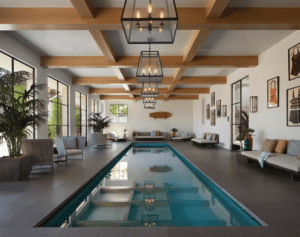
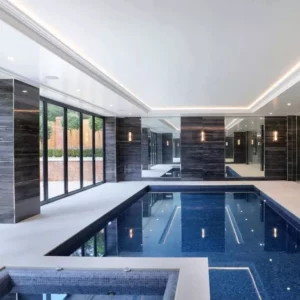
Additional Considerations of Indoor and Outdoor pool
When planning a pool, it is important to consider several key points. These include the pool’s location, the required space, and the impact of climate. Additionally, it is important to consider the health benefits of having a pool.
Space and Location Requirements for Each Pool Type
Outdoor pools need enough space to fit the pool, deck, landscaping, and safety features like fencing. They work best in large backyards where they can get plenty of sunlight and privacy.
Indoor pools require a well-ventilated room with proper heating and humidity control to prevent mold and building deterioration. To ensure safety and functionality, position the pool logically. Constructing a new building or remodeling an existing space can greatly impact the project’s cost and feasibility.
Climate and Weather Considerations in Decision-Making
When deciding between an indoor or outdoor pool, it’s important to take into account the local climate. In warm and sunny areas, outdoor pools are the best choice since they can be used for most of the year. However, in regions with long and cold winters, indoor pools are a more practical option since they can be used year-round regardless of the weather.
Legal and Zoning Considerations for Pool Installation
Before installing a pool, familiarize yourself with local zoning laws and building codes. These laws and codes determine the size, design, safety, and location of the pool on your property. The most crucial step in the pool installation process is obtaining the necessary permits and following all regulations.
We explored indoor and outdoor swimming pools, considering their design, location, climate impact, health benefits, and legal requirements.
Outdoor pools look great and blend well with the surroundings, but they are affected by the weather and require careful consideration of climate and seasonal use. Indoor pools offer year-round swimming and a peaceful environment but require significant initial investment and ongoing climate control.
Choosing the right pool is a personal decision that depends on factors such as budget, physical site characteristics, and lifestyle. Whether you prefer an outdoor or indoor pool, it should harmonize with the rhythm of your life and transform your home into a haven of joy and relaxation. The best pool for you depends on your personal aspirations and practical constraints. Whether you prefer an outdoor or indoor pool, it should harmonize with the rhythm of your life and transform your home into a haven of joy and relaxation. Whether you prefer an outdoor or indoor pool, it should harmonize with the rhythm of your life and transform your home into a haven of joy and relaxation.
